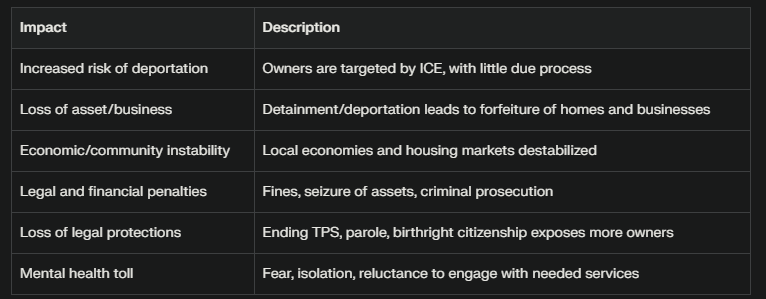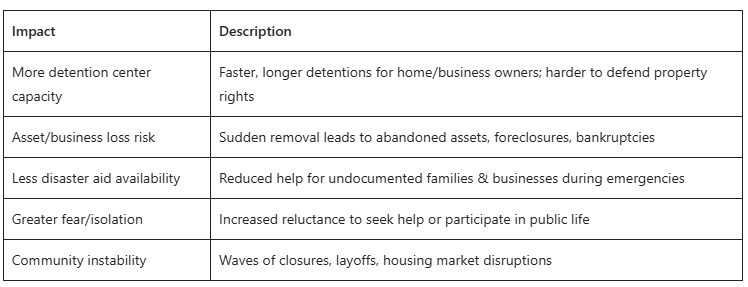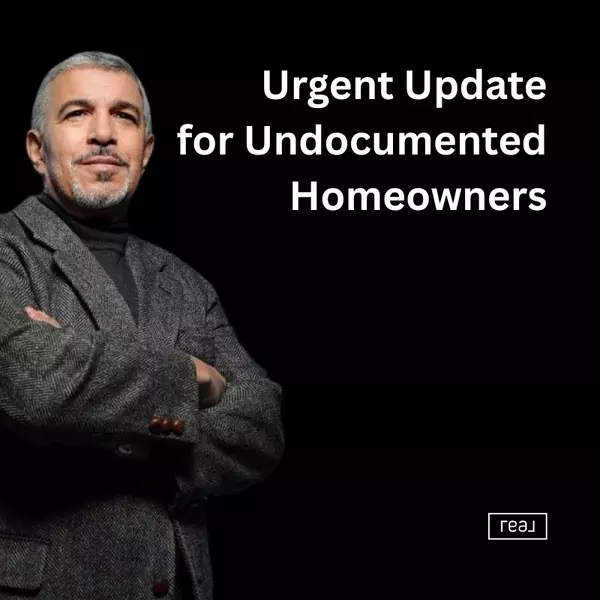Undocumented Home and Business Owners

The Trump administration’s escalated deportation policies—with massive ICE recruitment, a $50,000 signing bonus, and relaxed age restrictions—have several direct and indirect impacts on undocumented home and business owners:
Key Impacts
-
Increased Deportation Risk
The aggressive expansion of ICE and enhanced enforcement tactics mean undocumented individuals—including home and business owners—face a dramatically higher risk of detention and removal, often with limited or no due process. The administration has implemented rapid registration and expedited removal processes, specifically targeting undocumented populations for mass deportation campaigns. -
Asset and Business Disruption
Owners of homes and businesses who are detained or deported often lose access to their property or livelihood. Businesses, especially those reliant on their immigrant owner’s daily management, can collapse abruptly, leaving employees jobless and destroying investments. Homes are abandoned or placed in legal limbo, with mortgage default and foreclosure risks surging among immigrant families. -
Broader Economic Effects
Large-scale deportations contribute to instability in local economies, particularly in industries like construction, agriculture, hospitality, and small retail, where undocumented business owners are common. Mass removals produce sudden drops in workforce and consumer demand, indirectly affecting neighboring businesses and housing markets. Evidence shows mass deportation threats can raise housing prices for remaining families but cause rental market uncertainty and a glut of abandoned properties. -
Fear and Mental Health Strain
The threat of ICE raids—now extended to schools, hospitals, and places of worship—creates constant fear among undocumented owners, damaging health and well-being. Many avoid public opportunities, legal proceedings, or necessary social services, further isolating families and businesses. -
Legal and Financial Liabilities
The administration has also imposed new fines and registration requirements, with hefty penalties for failing to comply. Undocumented individuals who don’t register or are detained may face criminal prosecution, loss of work permits, seizure of assets, and other financial hardships. -
Loss of Legal Protections
By terminating programs like TPS and temporary parole, and attempting to end birthright citizenship for children born to undocumented parents, the administration increases the population facing asset loss and deportation, including some previously protected homeowners and business operators.
Table: Effects on Undocumented Home and Business Owners

he reallocation of $608 million in FEMA disaster relief funds to ICE—meant to help states build and expand immigrant detention centers—adds significant force to the Trump administration’s immigration enforcement surge, with direct consequences for undocumented home and business owners.
Specific Impacts
-
Expanded Detention Capacity
With FEMA’s $608 million now supporting state and local construction of detention centers, ICE gains the ability to detain thousands more immigrants at any time. This means arrests of undocumented home and business owners will result in longer and more certain detention, sometimes far from their communities or support networks, making legal defense and asset management even harder. -
Increased Likelihood of Asset Loss
Detained owners are often unable to manage homes or businesses, resulting in abandoned properties, foreclosures, business closure, loss of jobs for employees, and disruption of local economies. The expedited removal processes and ICE’s larger operational capacity (now backed by FEMA funds) further decrease the window for owners to arrange their affairs, sell assets, or transfer responsibilities—raising the chances of abrupt financial ruin. -
Reduced Disaster Resilience for Immigrant Communities
The diversion of disaster relief funding away from FEMA’s original purpose means fewer resources are available for responding to hurricanes, floods, and other emergencies, especially affecting vulnerable undocumented families and businesses. These communities may be hit harder and recover more slowly from disasters, with less support for rebuilding homes and businesses or accessing shelter. -
Heightened Community Fear and Legal Uncertainty
Knowing that facilities built with what would have been disaster recovery and shelter funds are now used to house detainees, immigrant communities experience greater anxiety, fearing both deportation and lack of help during crises. Some may avoid reporting emergencies, seeking medical care, or engaging in local commerce to stay under the radar. -
Social and Economic Ripple Effects
Local economies, especially in states actively participating in the ICE detention expansion, suffer from business closures and rental market instability. Consumer demand drops as deportations and detentions target large swaths of undocumented entrepreneurs.
Effects of FEMA Reallocation for ICE on Undocumented Home & Business Owners

In conclusion, the repurposing of FEMA disaster relief funds for ICE detention facilities deepens the risks for undocumented home and business owners—not just through direct immigration enforcement, but by crippling their resilience to all forms of crisis, further destabilizing immigrant communities and local economies.
What You Can Do
For Undocumented Home and Business Owners
-
Seek Legal Help Early
Connect with immigration attorneys or trusted legal aid organizations to understand your rights and explore any possible legal protections available to you and your family or business. -
Know Your Rights
Educate yourself on your rights during ICE interactions, such as when agents show up at your home or place of work. Organizations often provide easy-to-understand rights guides in multiple languages. -
Prepare Important Documents
Keep critical documents (identification, property titles, business records) organized and accessible. Consider making copies and leaving them in a safe place in case of sudden detention. -
Build a Support Network
Create a reliable system of family, friends, and advocates who can help manage your home or business if you face detention or deportation.
For Community Members and Allies
-
Support Local Immigrant Organizations
Volunteer or donate to community groups that provide legal aid, mental health services, and emergency assistance to undocumented residents impacted by deportations. -
Advocate for Policy Change
Contact your elected representatives to express opposition to aggressive deportation policies and support for immigrant-friendly reforms, such as pathway to citizenship, sanctuary policies, or moratoriums on deportations. -
Promote Community Trust
Encourage local law enforcement agencies to establish clear “safe zone” policies where ICE enforcement is limited, helping build trust and cooperation between immigrant communities and police. -
Raise Awareness
Share credible information about rights and resources via community meetings, social media, or local events to reduce fear and isolation among undocumented individuals.
For Employers and Business Partners
-
Implement Worker Protections
Avoid discriminatory practices against undocumented employees and provide information about their rights and available support. -
Prepare for Contingencies
Develop plans to manage sudden workforce shortages due to ICE raids or deportations, including cross-training staff and connecting with immigrant business networks. -
Collaborate with Advocacy Groups
Partner with organizations working to protect immigrant rights to access resources, training, and community support.
For Everyone
-
Stay Informed
Keep up-to-date on changes in immigration policies and enforcement practices through reputable news sources and trusted community organizations. -
Create Emergency Plans
Have emergency contact information, childcare arrangements, and access to funds in place for families who may face detention or deportation. -
Promote Inclusive Communities
Foster welcoming environments through schools, workplaces, and neighborhoods to support mental health, stability, and economic resilience amid these challenges.
As such, undocumented home and business owners today face unprecedented risks to their homes, businesses, stability, and health under the expanded Trump administration immigration and deportation policies.
 WE'RE HERE TO HELP - TAKE ACTION TODAY
WE'RE HERE TO HELP - TAKE ACTION TODAY
Our Trusted Network Includes:
-
Our Trusted Network Includes
🛡️ Immigration Attorneys
Experts in legal representation and deportation defense. They help secure emergency stays, file asylum or adjustment of status applications, and protect clients’ right to due process.🏢 Property Managers
Oversee the day-to-day management and legal protection of real estate holdings, ensuring continuity of income and asset value even in the owner’s absence.💰 Specialty & ITIN Lenders
Offer mortgage and financing solutions for individuals without Social Security Numbers, including rent-to-own or fallback arrangements if immigration status changes.🏡 Realtors (That’s us!)
We coordinate with legal, financial, and property professionals to create comprehensive solutions that protect our clients’ homes, businesses, and legacies.🤲 Community-Based Organizations (CBOs)
Trusted partners that offer legal aid, emergency planning, housing assistance, translation, financial literacy, and “know your rights” workshops for immigrant families and entrepreneurs.
If you have questions or need guidance on homeownership as an undocumented immigrant, contact us or speak to an immigration lawyer. We’re here to help you make informed, empowered decisions.
Brooklyn Home Sweet Homes is committed to supporting all homeowners—including those navigating the challenges of undocumented status. Let’s build security through knowledge, not assumptions.
Categories
Recent Posts










GET MORE INFORMATION

